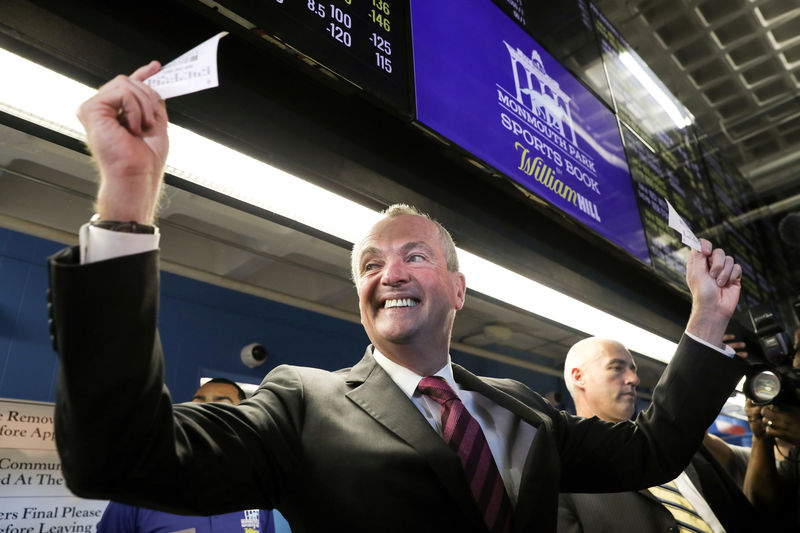By Laila Kearney
NEW YORK (Reuters) - On the day Jeff Wasserman's decades-long gambling addiction came to a head, the Delaware lawyer found himself parked outside a convenience store with three agonizing options: end his life, flee the country or come clean and get help.
"I raised the white flag in my own mind," Wasserman, 63, said of the day he decided to seek help for a problem that had secretly consumed hundreds of thousands of dollars, his retirement savings and his career. "I knew that it was D-day."
Wasserman is now more than three years into his recovery, which started with a phone call to Delaware's anti-gambling addiction program.
It is one of a growing number of publicly-funded programs that face a financial crunch as U.S. states jump at the chance to collect revenue through legal sports betting, while largely ignoring the need to spend more tackling gambling addiction.
Of the eight U.S. states that legalized full-scale sports betting, only three have increased funding for problem gambling services. And the contributions have been small, according to state officials and program directors.
None of those states, or the additional 15 and the District of Columbia that introduced bills in 2018 to legalize sports betting, have followed the National Council on Problem Gambling (NCPG) recommendation to dedicate 1 percent of legal sports betting revenue to problem gambling services.
New Jersey, where legal sports betting activity has taken off since it began in June, comes the closest.
For a graphic on State of play for legal sports betting in U.S. states, see - https://tmsnrt.rs/2O4FxHo
FIGHTING FOR FUNDING
Pennsylvania and Rhode Island have increased gambling addiction funds. But only by 0.2 percent of sports wagering gross revenue for Pennsylvania and an annual bump of $25,000, for the nation's smallest state, state officials said.
The remaining five - Mississippi, West Virginia, Nevada, New York and Delaware - have not yet agreed to add funds to addiction programs.
Delaware was the first state to launch full-scale legal sports betting after the U.S. Supreme Court lifted a ban on the practice in May. The state's anti-gambling addiction program is fighting for more money.
"We're going to have to be treating more people. We'll have to expand our prevention advertising, and we can't do that with the funding we currently receive," said Arlene Simon, who runs the Delaware Council on Gambling Problems.
In Nevada, which has long had legal sports betting and roughly six percent of the population is addicted to gaming, more addiction treatment centers are expected to apply for public funds next year on top of the current seven, said Kim Garcia, who leads the Nevada Problem Gambling Program. However, there is no planned increase to the program's $1.2 million annual budget, Garcia said.
Problem gamblers in Mississippi, which recently launched both sports betting and approved a state lottery, may soon find themselves without options for help.
Funding for the Mississippi Council on Problem and Compulsive Gambling was left out of the state's new gambling legislation. A 40 percent budget deficit puts it on course to close its doors within two years, said program director Betty Greer.
The state's gambling services provider, which once offered free counseling sessions, has been whittled down to a helpline that operates on $100,000 a year, Greer said.
The launch of legal sports betting is an important time for states to dedicate funds to counteract gambling's negative impacts, said Oregon-based Jeff Marotta, whose company, Problem Gambling Solutions, conducts the National Survey of Problem Gambling Services.
"Bills can be written in a way that set up all kinds of protections," Marotta said. "I don't think enough people think about that."
STATES SEE UPSIDE, NOT PROBLEM
Gambling addiction, which affects a little more than two percent of the U.S. population, has attracted far less attention than drug, tobacco and alcohol addictions.
U.S. public funding for substance abuse treatments is 334 times larger than for all gambling addiction services, but those problems are only 3.8 times more common, according to the 2016 gambling addiction services survey. That imbalance is likely to grow with a renewed focus on the nation's opioid crisis.
The estimated social costs of problem gambling are about $6.5 billion per year, with criminal justice and health costs making up the bulk of spending.
Still, states tend to focus on the upside of gambling, said NCPG Executive Director Keith Whyte.
"Most states that do have legalized gambling see it primarily as a revenue source, a jobs generator, rather than as a public health issue," Whyte said.
The American Psychiatric Association only started listing problem gambling as a behavioral addiction alongside drug abuse in its manual that classifies mental disorders in 2013. Previously, it was categorized alongside impulse-control disorders, such as kleptomania and compulsive shopping.
The reclassification could lead to a shift in public sentiment and possibly more long-term funding for gambling addiction, Whyte said.
Wasserman, who now does judicial outreach for the Delaware Council on Gambling Problems, only realized his problem was a bona fide addiction after starting treatment. That is not unusual, experts said.
That was the case for West Virginia carpenter Marshal Verzich, who also reached out for help with a 13-year addiction to slot machines on the day he contemplated suicide.
"The sense of remorse at that moment was so great that I didn't see any reason to go on," Verzich said of the February 2015 day he left his local Charles Town casino after spending 18 hours and more than $1,000 on slots.
Instead, Verzich's wife talked him into calling the state's gambling addiction hotline for help. Through that service, Verzich attended a support group retreat for recovering gambling addicts and their families.

"That was the first time I had heard from other people with the same problem that I had. People don't realize that it's a disease."
